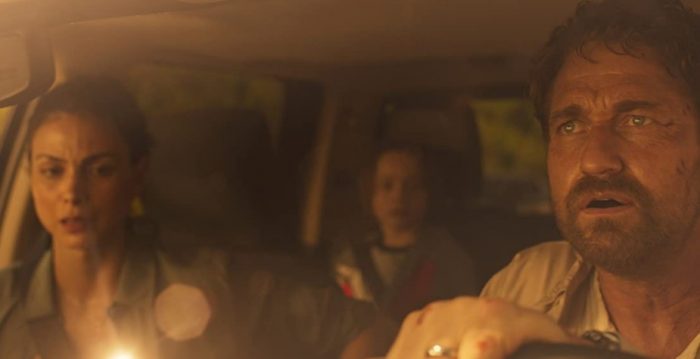Crater than the sum of its parts, Gerard Butler’s latest flick about a planet-killing comet is a surprising treat, bursting from its B-movie expectations.
Ah, the disaster movie. A unique genre host to some of the worst creations in cinematic history. The likes of 2012 (2009) or Pompeii (2014) often appear on lists of the worst films of the 21st century. Yet, there have been some blockbusters which exposed the deep impact that this great genre can have, Jan de Bont’s Twister (1996) is regularly reassessed as a genre classic and Towering Inferno (1974) set the blockbuster world ablaze. Sitting comfortably among these titans of tragedy is Ric Roman Waugh’s newly released Greenland.
Starring the ever so misunderstood Gerard Butler, Greenland is the latest spin on the disaster movie reel, which this time opts for the threat of a world-ending comet. The story follows a small family: the father John Garrity (Gerard Butler), his estranged wife Allison (Morena Baccarin), their son Nathan (Roger Dale Floyd), and their attempts to survive the world-ending event.
The family of three navigate the dramatic apocalyptic stakes in relatively conventional fashion. There is nothing revolutionary about the way in which this story is told, regularly slipping into conventions and tropes which disaster films struggle to shake. However, with director Ric Roman Waugh’s film, none of that matters. What gives Greenland the emotional grab and heart above other disaster flicks is the simplicity in its approach.
Genre movies of this kind have often over-stepped the mark in baggage and excessive attempts to engage the viewer. Greenland works in the way a disaster movie is supposed to. A fun-filled dose of action-packed fun, intelligently condensed into a roughly 2-hour runtime. Chris Sparling’s affecting screenplay finds a sweet spot in the search for that perfect blend of tension, over-the-top action, and often emotion that is found in all the best disaster flicks.
Besides the central trio and occasional passengers along the way, the rest of the world seems surprisingly insignificant for a world-ending drama. Secondary figures we do find throughout the journey include Allison’s father, which allowed for a wonderful appearance from Scott Glen, reaffirming the film’s strong family-oriented narrative.

Sometimes, the greatest antidote to lockdown gloom is to escape into an end-of-the-world visual treat and think “Well, at least we’re not at that point, yet“. Still, there was something strangely timely about the importance of family emphasised on screen, an appropriate sentiment to which the film surely owes a tip of the hat.
Of course, this is a film starring Gerard Butler, the only actor who seemed completely in-place in the baffling Movie 43 (2013). And following the painfully poor “Has Fallen” trilogy, I can’t say that my hopes were high when approaching a disaster movie starring the man himself. But Butler was perfectly fine in Greenland. At worst serviceable, while at his best, dare I say it, actually quite good.
Admittedly, I am a relative novice to the disaster movie section of cinema. However, as I began the film with a cynical sniff, I soon finished it with a fanatical gawp. Immediately, I was spurred on to watch many other end-of-the-world flicks, such as The Quake (2018) and The Wave (2015). So, if there’s any way to summarise the heart-pounding energy and excitement of Greenland, that’s it.
